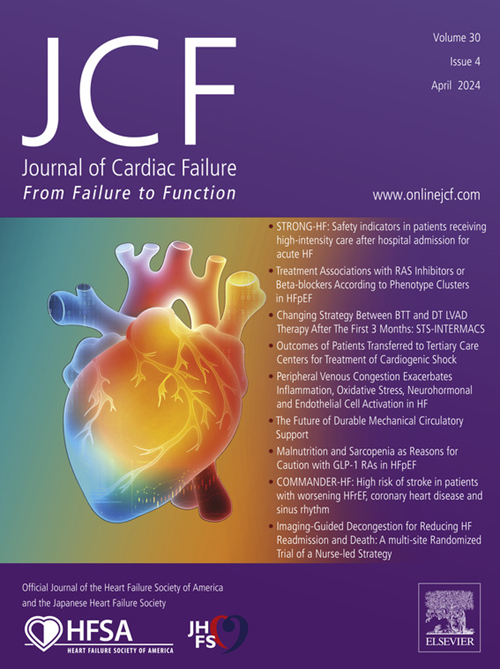心源性休克患者成功脱离机械循环支持的新型预测评分模型。
IF 6.7
2区 医学
Q1 CARDIAC & CARDIOVASCULAR SYSTEMS
引用次数: 0
摘要
背景:目前尚缺乏有关预测机械循环支持(MCS)成功断流的临床证据。本研究旨在创建一个简单的风险评分,以预测心源性休克患者能否成功从机械循环支持断流:这项回顾性单中心队列研究纳入了2013年1月至2023年6月期间接受静脉-动脉体外膜氧合或IMPELLA治疗的114例连续心源性休克患者。院外心脏骤停患者除外。主要终点是成功断除体外膜肺氧合(MCS),其定义是在无需再次植入体外膜肺氧合的情况下成功拔管,并存活至出院。我们采用逐步变量选择的多变量逻辑回归来生成预测模型。我们首先建立了一个通用断流评分模型,然后使用相同的变量建立了一个简单版本的评分模型:结果:55 名患者成功从 MCS 断奶。断奶评估期间测量的以下变量被选为断奶评分模型的组成部分:急性心肌梗死(AMI)、平均血压、左室射血分数(LVEF)、乳酸水平和 QRS 持续时间。根据研究结果,我们建立了一个预测 MCS 成功断流的新型断流评分模型:1.774-2.090×(AMI)+0.062×[平均血压(毫米汞柱)]+0.139×[左室射血分数(%)]-0.322×[乳酸(毫克/分升)]-0.066×[QRS(毫秒)]。以下变量被选为简单版断奶评分模型的组成部分:AMI、平均血压≥80 mmHg、乳酸35%:我们建立了一个简单的模型来预测心源性休克患者能否成功从 MCS 断流。本文章由计算机程序翻译,如有差异,请以英文原文为准。

A Novel Predictive Score Model for Successful Weaning From Mechanical Circulatory Support in Patients With Cardiogenic Shock
Background
Clinical evidence regarding predictors of successful weaning from mechanical circulatory support (MCS) is lacking. This study aimed to create a simple risk score to predict successful weaning from MCS in patients with cardiogenic shock.
Methods and Results
This retrospective single-center cohort study included 114 consecutive patients with cardiogenic shock treated with venoarterial extracorporeal membrane oxygenation or IMPELLA between January 2013 and June 2023. Patients with out-of-hospital cardiac arrest were excluded. The primary end point was successful weaning from MCS, defined as successful decannulation without the need for MCS reimplantation and survival to discharge. Multivariable logistic regression with a stepwise variable selection was performed to generate the prediction model. We first developed a general weaning score model, and then created a simple version of the score model using the same variables. Fifty-five patients were weaned from MCS successfully. The following variables measured during weaning evaluation were selected as the components of the weaning score model: acute myocardial infarction (AMI), mean blood pressure, left ventricular ejection fraction (LVEF), lactate level, and QRS duration. According to the results, we conducted a novel weaning score model to predict successful weaning from MCS: 1.774 – 2.090 × (AMI) + 0.062 × [mean blood pressure (mm Hg)] + 0.139 × [LVEF (%)] – 0.322 × [Lactate (mg/dL)] – 0.066 × [QRS (ms)]. The following variables were selected as the components of the simple version of the weaning score model: AMI, mean blood pressure of ≥80 mm Hg, lactate of <10 mg/dL, QRS duration of ≤95 ms, and LVEF of >35%.
Conclusions
We developed a simple model to predict successful weaning from MCS in patients with cardiogenic shock.
求助全文
通过发布文献求助,成功后即可免费获取论文全文。
去求助
来源期刊

Journal of Cardiac Failure
医学-心血管系统
CiteScore
7.80
自引率
8.30%
发文量
653
审稿时长
21 days
期刊介绍:
Journal of Cardiac Failure publishes original, peer-reviewed communications of scientific excellence and review articles on clinical research, basic human studies, animal studies, and bench research with potential clinical applications to heart failure - pathogenesis, etiology, epidemiology, pathophysiological mechanisms, assessment, prevention, and treatment.
 求助内容:
求助内容: 应助结果提醒方式:
应助结果提醒方式:


